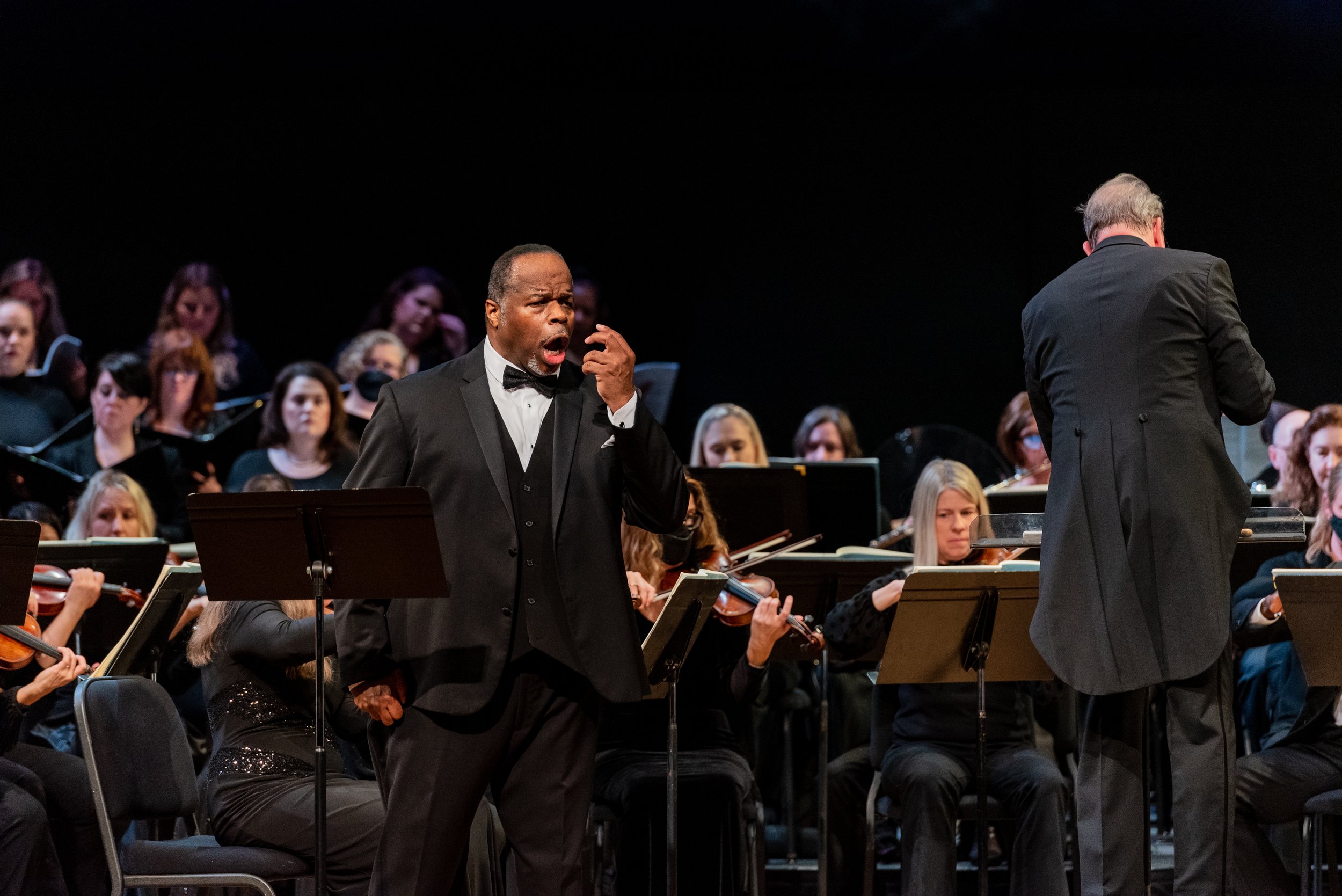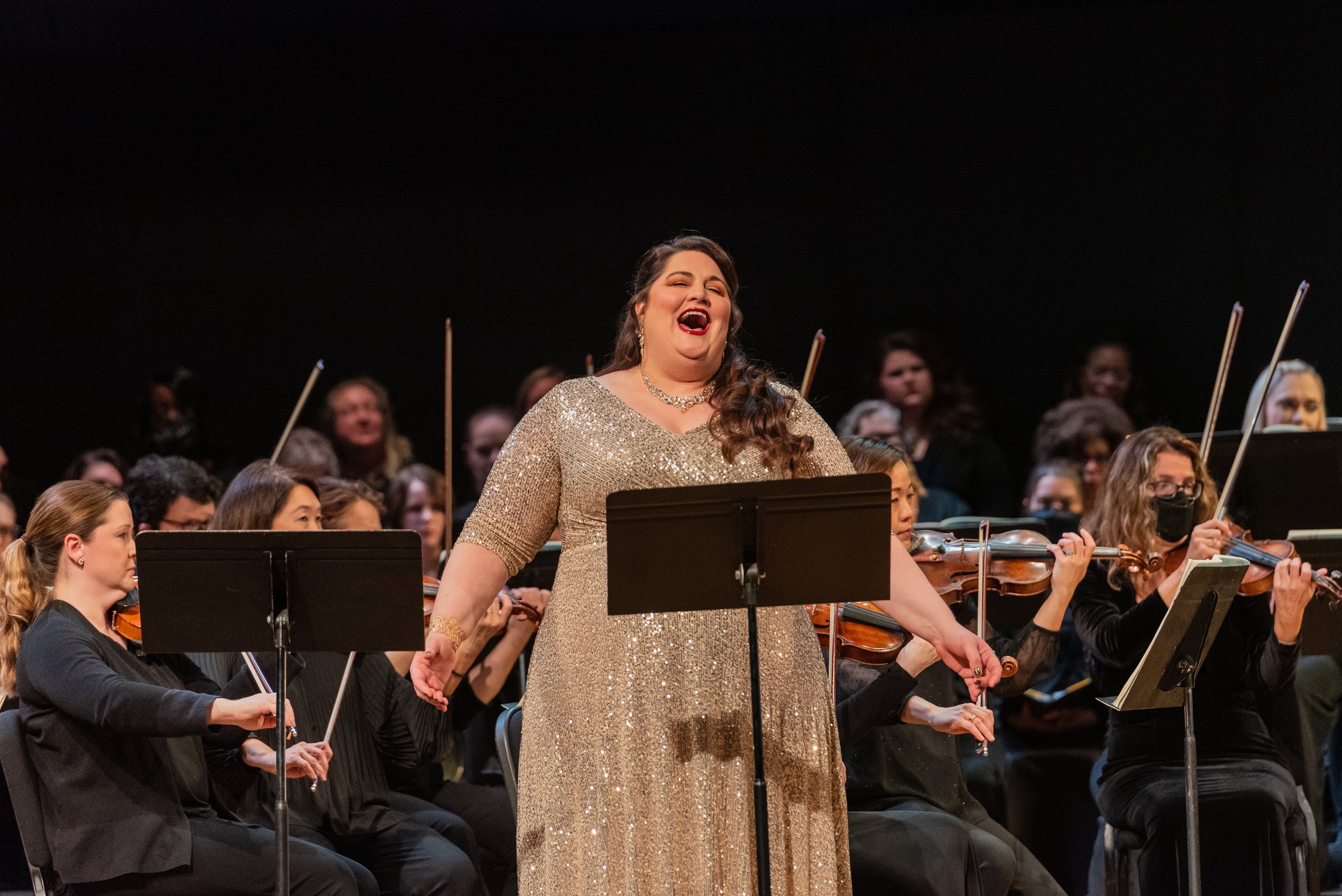Forgive the pun, but frankly, I was a little shocked by Giuseppe Verdi’s Nabucco, knowing little about it going in. First, I had not seen this opera because it hasn’t been performed in the mid-Atlantic since 2015 as best as I can tell, about the time I first became an opera fan, and as Giuseppe Verdi’s third opera and his first opera to achieve notable success, it frankly was a low priority item, given the many great ones of his to see first; I had just seen his Shakespearean masterpiece, Otello, performed the night before by Maryland Lyric Opera, and I have seen a dozen operas by Verdi in total. Nabucco had been on my list but not urgent. I now feel a debt of gratitude to Washington Concert Opera’s Artistic Director and Conductor Antony Walker for bringing it forward.
Washington Concert Opera’s Orchestra and Chorus on stage for performance of Nabucco. Photo by Caitlin Oldham; courtesy of Washington Concert Opera.
What gave me a bit of a jolt in viewing this work is that Nabucco is a Bible story, complete with redemption and miracles. It’s not just surprising to see this in today’s more secularized American society, but given all the other Verdi operas I’ve seen, it seemed surprising to me that Verdi chose a Bible story. He did write the religious work Requiem, but that was to commemorate the death of Italian novelist and poet Alessandro Manzoni. Nabucco is a Bible story. As I thought about it, I wondered why there aren’t more well-known operas based on stories in the Bible; only Sampson and Delilah and Salome come readily to mind. This despite the history of music and religion being so closely entwined in the development of music. Early composers seemed to prefer Greek gods for their subjects, perhaps because censors, through much of opera’s existence, were quite picky about how Biblical characters were depicted on stage? In fact, Nabucco’s religious aspect gets largely explained away by music historians who state the story struck a chord with Italians of Verdi’s day because it dealt with displaced people at a time of the Risorgimento, the drive to reunify Italy. It’s most popular choral number “Va, penseiro” became an anthem for Italian unification and independence. Verdi was a strong supporter of the Risorgimento, and as such, became a hero to supporters of reunification. In 1859, a phrase began appearing on the walls of Naples, “Viva, Verdi!”, a coded salute that was an Italian acronym expressing support for the King of Italy (Viva Vittorio Emmanuele Re D’Italia). Regardless of whether Verdi knew what he was doing or lucked onto the right theme for a hit opera, the rest is history and history is based on a true story.
The librettist for Nabucco was Temisocle Solera. He was an author who penned five operas in all with Verdi, but Nabucco is the only one to remain in today’s repertoire. Their previous opera together, Un Giorno di Regno, was a flop and was hissed off the stage; Verdi almost gave up composing. That opera was written at a very difficult time for Verdi; his wife at age 26 and his two young children had died over a three-year period. Writing Nabucco helped pull him out of depression and launch his illustrious career. Solera based the libretto on the history of King Nebuchadnezzar II of Babylonia (Nabucco in the opera) as related in several books of the Old Testament, especially the book of “Daniel”, but of course the team added a love story and some political infighting as operatic opportunism. In the opera, the fierce warrior king attacks and destroys Jerusalem and relocates most of its Jewish people to Babylon in bondage; this part accords with historical records. With his battlefield success, he became so arrogant he declared himself God which caused the Hebrew God to strike him with a thunderbolt making him infirm and unfit to serve, but he later repents, and God restores his faculties, allowing him to serve and make amends; this loosely accords with the Old Testament, though the dreams interpreted by Daniel are not included.
Lester Lynch as Nabucco and Alexandra Loutsion as Abigaille. Photos by Caitlin Oldham; courtesy of Washington Concert Opera.
Meanwhile for the fictional part of the opera, his daughter Fenena, who just wants everybody to get along, was in love with the Hebrew Ismäele and had converted to Judaism. Ismäele then got into trouble for appearing soft on the Babylonians due to his relationship with Fenena. This made it ripe for Nabucco’s ambitious, adopted daughter Abigaille (like adopted daughter, like father) to seize the throne and threaten her sibling and all of the ancient Israelis with death; she eventually also has a conversion when Nabucco regains his senses thanks to appealing to the Hebrew God and takes back the throne. All of this creates the characters and drama allowing Verdi to compose accompanying music to complement the action and communicate the human feeling and emotion for which he is known. Clearly, Verdi’s interest was in people and human nature, and at that, he was very, very good.
Peter Volpe as Zaccaria and Conductor Antony Walker. Photo by Caitlin Oldham; courtesy of Washington Concert Opera.
Would I go to see Nabucco again? If it had a cast of the caliber that WCO brought forward, absolutely! It may be early Verdi; yes, the story could use some work, and the music could use some finesse, but it’s still Verdi! It has the beautiful emotion-filled arias that challenge the singers and provides the dramatic melodies that engulf you, exactly what we expect of Verdi. Maestro Walker conducted the WCO Orchestra with his usual dramatic flair, beautifully bringing forward a sumptuous rendition of Verdi’s music, including directing a banda of horns placed behind the audience in the hallway. It is a delight visually and acoustically to have a full orchestra on stage instead of in a pit, a positive feature of concert opera. With Verdi, the chorus is always a major player in telling the story, and led by David Hanlon, the WCO Chorus also contributed beautifully to the evening, especially noteworthy was their lovely singing of “Va, pensiero”.
Andres Acosta as Imäele and Melody Wilson as Fenena. Photo by Caitlin Oldham; courtesy of Washington Concert Opera.
The role of Nabucco was played by internationally acclaimed Verdi baritone Lester Lynch. We have seen him locally in WCO’s Maria di Rohan in 2018 and just last year as Macbeth in Maryland Lyric Opera’s Macbeth. Mr. Lynch commands the stage in every performance as he did Saturday night, although soprano Alexandra Loutsion as his daughter Abigaille went toe to toe with him in a powerful duet. One highlight of the performance was Mr. Lynch’s ability to elicit sympathy for Nabucco in his incapacitated state. Another was Ms. Loutsion’s command of her upper register and the delight she demonstrated in playing a meanie; I will have to give her some slack, after all, her love interest in Ismäele was rejected. I have seen Ms. Loutsion before as Tosca for Wolf Trap Opera, as Florencia for Pittsburgh Opera, and Brünnhilde for Virginia Opera, and she always delights. The other singer of the evening to be added to the highlight reel was bass Peter Volpe who played high priest Zaccaria proclaiming God’s power at several important points in the action. He has a jaw dropping appeal as an authority figure with his strong deep, deep bass voice.
l to r: Rolando Sanz as Abdallo, Matthew Scolin as High Priest, and Lester Lynch as Nabucco. Photo by Caitlin Oldham; courtesy of Washington Concert Opera.
The singers playing the young lovers acquitted themselves impressively, tenor Andres Acosta as Ismäele and mezzo-soprano Melody Wilson as Fenena. I saw Mr. Acosta recently in Virginia Opera’s Fellow Travelers, and he is clearly a rising star in the opera world. Ms. Wilson brought a tenderness to her role with her lovely mezzo voice; I hope to hear more. The excellent cast of supporting roles included base Matthew Scolin as high priest, soprano Teresa Perotta as Anna, and tenor Rolando Sanz as Abdallo.
l to r: Peter Volpe as Zaccaria, Melody Wilson as Fenena, Andres Acosta as Ismäle, and Teresa Perrotta as Anna.
Following the singing of “Va, Pensiero” in Act III, the enthusiastic audience response included shouts for an encore to the point that Conductor Walker turned to the audience and stated we would get our encore, but at the end. At the end of the performance and after audience applause for the performers, he preceded the encore with comments explaining that this piece was loved by the Italians at a time when they identified as a displaced people and that he wished to dedicate the encore to all the displaced people of the world. To which, I add “Amen”.
The Fan Experience: Washington Concert Opera concluded their 2022-2023 season with the performance of Nabucco on March 4 in George Washington’s Lisner Auditorium. The opera was sung in Italian with English surtitles on a screen overhead. There are plans underway for “Outside Opera” events this spring; check back with the website for announcements.
WCO’s 2023-2024 season was announced in opening comments by Executive Director Meg Sippey and will include Rossini’s Ermione on Dec 2 and Puccini’s La Rondine on April 7, 2024. She also solicited the audience to send feedback on whether Saturday or Sunday performances were preferable; December 2 is a Saturday and April 7 in 2024 is a Sunday. My sports preferences occur on both Saturday and Sunday, so no preference there for me. On the other hand, Saturday is more of a night out night, so I might prefer that day, slightly, but I just hope to be there regardless.
Peter Russell, General Director of Vocal Arts DC, presented a pre-opera talk and provided program notes. Mr. Russell also presents a one-hour lecture on each production in the free Opera Gems Online series. His lectures are impressively detailed and informative, with samples of the music to be heard; he also writes the program notes for WCO.
In my experience, all the seats in Lisner Auditorium are fine for viewing the performance, but the sound is probably better towards the center of the auditorium. Parking on the street around the auditorium is catch as catch can; be sure to read the signs! Metro is two blocks away. WCO has a visitor web page with directions and parking info, helpful in finding nearby parking lots.







